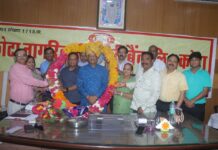
80-year old from Bharatpur, Rajasthan Learnt New Ways of Cash Management Post Demonetisation.

Ravindra Kumar, an 80-year old from a small Bharatpur-based village Andhiaari, dreamt of purchasing a new tractor worth Rs. 6-7 lakhs. He intended to sell his old tractor for 3 lakhs and saved up to Rs. 1.65 lakhs in cash to raise funds for this purchase. The remaining money could’ve been easily arranged from local money lenders at reasonable interest rates. He had planned to settle this debt by selling off his mustard produce in February. However, demonetisation came down hard on his dreams.
Following PM Modi’s announcement regarding currency ban on November 8, poor Ravindra Kumar was neither able to deposit the money in bank in absence of a PAN Card nor he was able to sell his old tractor to vendors. Modi’s demonetisation had crushed all his hopes.
“On November 8, while watching a Hindi movie on a television channel, I changed the channel during the break and was stunned to know that Rs 500 and Rs 1,000 currency notes have been banned,” he said.
Next morning when Kumar discussed this issue with fellow villagers, he realized the rumours were true. People informed him that his currency notes were useless, as he couldn’t use them anywhere. Despite all this confusion, the unnerved farmer was determined to sort this issue. He visited the nearest Punjab National branch and patiently waited for his turn in the long queue outside the bank gates. Unfortunately, he couldn’t approach the staff inside. After circling about the bank for 3 consecutive days, he was able to reach them on the fourth day.

Sadly, the bank staff refused to deposit his money in absence of a PAN card. When sad, desolate Ravindra returned home, his acquaintances advised him to deposit Rs. 49,500 in 3-4 instalments to dodge cumbersome PAN card formalities. Rather than quitting because of impending miseries, Ravindra Kumar, being a positive man, made up his mind to learn new ways of cash management.
With whatever little savings that he had, he bought a brand new 4G phone and downloaded Paytm app to learn the basics of electronic transfers. Thereafter, he applied for a cheque book in his bank and completed PAN card formalities. When asked if this decision would benefit the country, Kumar replied,
“Galat sahi ko to pato na hai, Modi ji ne janata ko pareshan kar diyo“.
(I don’t know the future implications of this decision whether it’s right or wrong, all I know is that PM’s decision had troubled the common man).
Nevertheless, Kumar hasn’t lost his hope yet. He’s positive that if he masters the new e-banking techniques, he’ll be able to overcome the persisting currency crunch. His confidence and never-dying spirit is an inspiring example for hundreds of politicians and common men in the city. Rather than protesting on the streets and cussing at the government, Ravindra Kumar chose a positive approach towards this problem.
He may not support government’s unplanned decision, but he’s optimistic about his efforts. When I see educated, socially ‘adept’ people debating and protesting at Parliament and outside public places, I’m forced to think, are we actually more intelligent and mature than rural farmers? We need to think over it.








